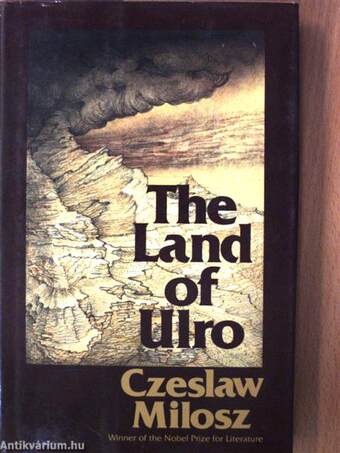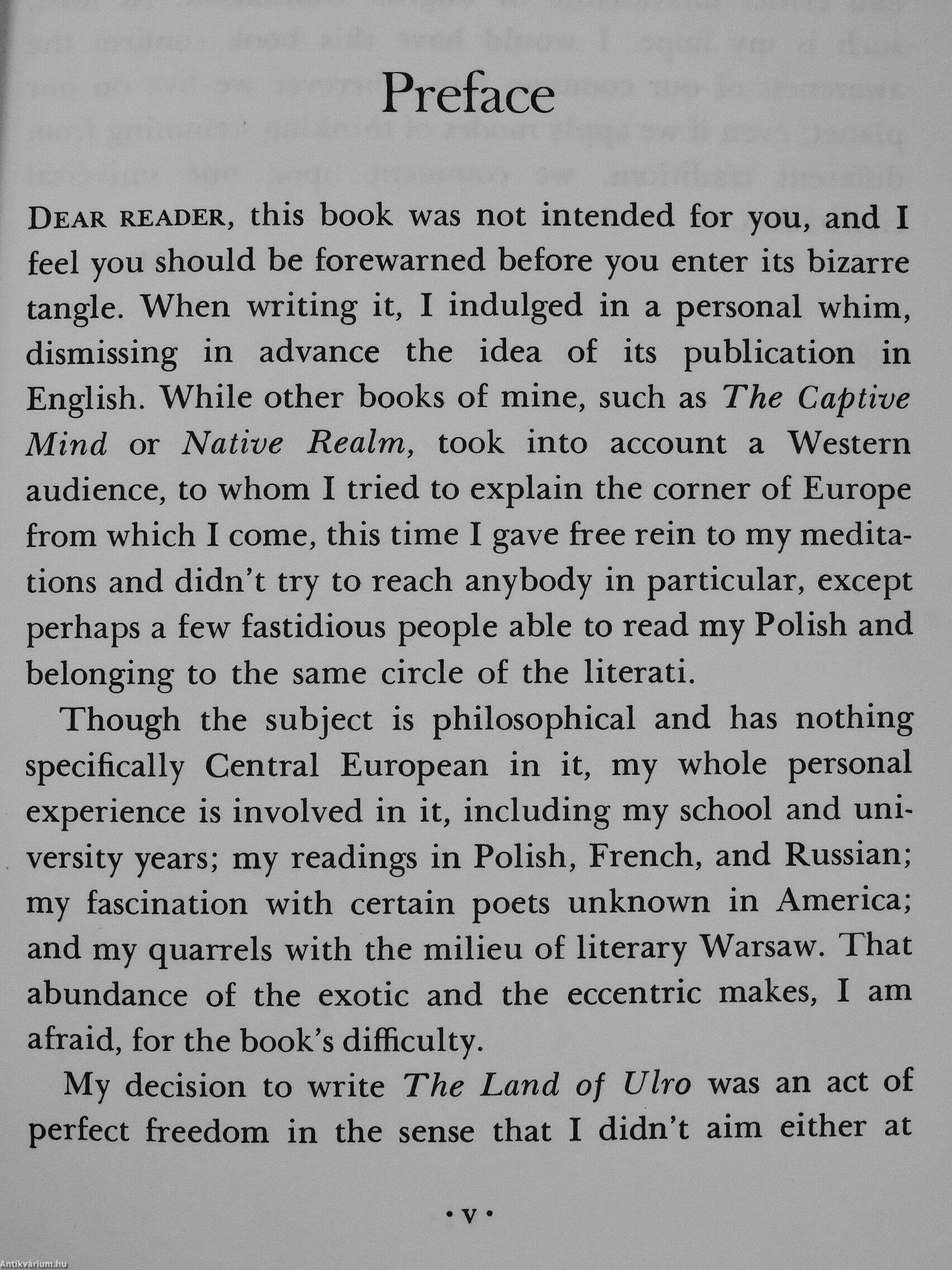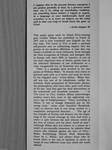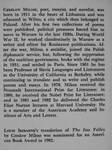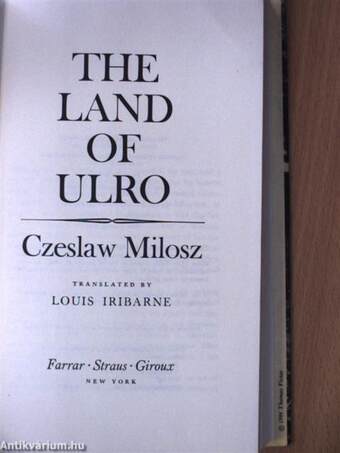1.067.694
kiadvánnyal nyújtjuk Magyarország legnagyobb antikvár könyv-kínálatát

VISSZA
A TETEJÉRE
JAVASLATOKÉszre-
vételek
The land of Ulro
| Kiadó: | Farrar Straus Giroux |
|---|---|
| Kiadás helye: | New York |
| Kiadás éve: | |
| Kötés típusa: | Félvászon |
| Oldalszám: | 287 oldal |
| Sorozatcím: | |
| Kötetszám: | |
| Nyelv: | Angol |
| Méret: | 22 cm x 14 cm |
| ISBN: | |
naponta értesítjük a beérkező friss
kiadványokról
naponta értesítjük a beérkező friss
kiadványokról
Előszó
TovábbFülszöveg
1 suppose that in the present literary enterprise 1 am guided, partially at least, by a perverse ambition: can I, by citing an unorthodox tradition, say something about matters I regard as urgent, in a language at once intellectually lucid and evocative, so as to leave an impress on the mind and in that way help to break down the gates of Ulro? -jrom chapter 30 This major prose work by Nobel Prize-winning poet Czeslaw Milosz was published in Polish in 1977 and is now translated into English for the first time. The Land of Ulro is both a spiritual self-portrait and an unflinching inquiry into the genesis of our modern afflictions. A man who was raised a Catholic in rural Lithuania, lived through the Nazi occupation of Poland, and emerged, first in Europe and, since 1960, in America, as one of our most important men of letters, speaks here of the inherited dilemmas of our civilization in a voice recognizable for its bluntness and passión. "Ulro" is a symbolic land invoked in the late... TovábbFülszöveg
1 suppose that in the present literary enterprise 1 am guided, partially at least, by a perverse ambition: can I, by citing an unorthodox tradition, say something about matters I regard as urgent, in a language at once intellectually lucid and evocative, so as to leave an impress on the mind and in that way help to break down the gates of Ulro? -jrom chapter 30 This major prose work by Nobel Prize-winning poet Czeslaw Milosz was published in Polish in 1977 and is now translated into English for the first time. The Land of Ulro is both a spiritual self-portrait and an unflinching inquiry into the genesis of our modern afflictions. A man who was raised a Catholic in rural Lithuania, lived through the Nazi occupation of Poland, and emerged, first in Europe and, since 1960, in America, as one of our most important men of letters, speaks here of the inherited dilemmas of our civilization in a voice recognizable for its bluntness and passión. "Ulro" is a symbolic land invoked in the late poems of William Blake. "It denotes that realm of spiritual pain such as is borne and must be borne by the crippled man," writes Milosz. "Blake himself was not one of its inhabitants, unlike the scientists, those proponents of Newtonian physics, the philosophers, and most other poets and artists of his day. And that goes for their descendants in the nineteenth and twentieth centuries . . ." In The Land of Ulro, Czeslaw Milosz acknowledges modern man's firm roots in the eighteenth century's Age of Enlightenment: "Then, according to Milosz, it was as though humanity got on the wrong train," writes critic Stanislaw Baranczak, "only to discover that it was being carried in a completely unexpected direction . . . The age of the triumph of Science and Reason was the beginning of the virtual cleavage of what had been a unity-a split between the cold abstract world of the la"ws of science and the inner world of man." Although Milosz does not believe in a return to a world of pre-scientific innocence, he admires those writers who rebelled against the laws of Ulro- Blake, Swedenborg, Simoné Weil, Dostoevsky, Oscar de L. Milosz, and others-those who labored, often at the cost of madness, to create an image of man different from that which the world offered.Czeslaw Milosz, poet, essayist, and novelist, was born in 1911 in the heart of Lithuania and was educated in Wilno, a city which then belonged to Poland. After his first two collections of poems were published, political pressures forced him to move to Warsaw in the late 1930s. During World War II, he worked clandestinely in Warsaw as a writer and editor for Resistance publications. After the war, Milosz, a socialist, joined the Polish diplomatic service, but, following the suppression of the coalition government, broke with the regime in 1951, and settled in Paris. Since 1961 he has been Professor of Slavic Languages and Literatures at the University of California at Berkeley, while continuing to translate and to write and publish poems and essays. In 1978, Milosz received the Neustadt International Prize for Literature; in 1980, he received the Nobel Prize for Literature; and in 1981 and 1982 he delivered the Charles Eliot Norton lectures at Harvard University. He is a member of the American Academy and Institute of Arts and Letters. Louis Iribarne's translation of The Issa Valley by Czeslaw Milosz was nominated for an American Book Award in 1982. Vissza
Témakörök
- Irodalomtörténet > Írókról, költőkről
- Idegennyelv > Idegennyelvű könyvek > Angol > Szépirodalom > Regény, novella, elbeszélés
- Idegennyelv > Idegennyelvű könyvek > Angol > Irodalomtörténet
- Irodalomtörténet > Dokumentumok, forráskiadványok
- Irodalomtörténet > Világirodalom > Európai irodalom > Közép-európai
- Irodalomtörténet > Irodalomtudomány > Korszakok > 20. századi
- Szépirodalom > Regény, novella, elbeszélés > Az író származása szerint > Európa > Lengyelország
- Szépirodalom > Regény, novella, elbeszélés > Tartalom szerint > Életrajzi regények > Önéletrajzok, naplók, memoárok
- Szépirodalom > Regény, novella, elbeszélés > Irodalmi díjas szerzők > Nobel-díjasok
Czeslaw Milosz
Czeslaw Milosz műveinek az Antikvarium.hu-n kapható vagy előjegyezhető listáját itt tekintheti meg: Czeslaw Milosz könyvek, művekMegvásárolható példányok
Nincs megvásárolható példány
A könyv összes megrendelhető példánya elfogyott. Ha kívánja, előjegyezheti a könyvet, és amint a könyv egy újabb példánya elérhető lesz, értesítjük.



